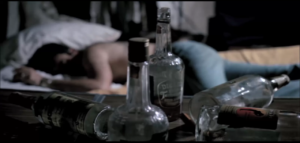Ibogaine offers an excellent alternative to the traditional 12-step programs that are common in treating alcohol addiction. Ibogaine helps eliminate the physical withdrawal symptoms, such as the shakes and sweats that are common when people stop drinking.
After Ibogaine treatment, former alcoholics will have forgiven both themselves and others for harmful things that were done in the past due to excessive drinking.
Alcohol addiction in all nations is a serious plague. The World Health Organization estimates that there are 140 million people suffering from alcohol addiction worldwide. Part of the problem is the social acceptance of drinking and the widespread availability of alcohol.
According to the National Institute on Alcohol Abuse and Alcoholism [NIAAA], men may be at risk for alcohol-related problems if their alcohol consumption exceeds 14 standard drinks per week or 4 drinks per day, and women may be at risk if they have more than 7 standard drinks per week or 3 drinks per day. A standard drink is defined as one 12-ounce bottle of beer, one 5-ounce glass of wine, or 1.5 ounces of distilled spirits.
 The risk of alcohol dependence can begin with low levels of drinking and increases directly with the volume, frequency and strength of the alcohol consumed. Young adults are particularly at risk
The risk of alcohol dependence can begin with low levels of drinking and increases directly with the volume, frequency and strength of the alcohol consumed. Young adults are particularly at risk
Alcohol Addiction Treatment is characterized by an increased tolerance of and physical dependence on alcohol, affecting the individual’s ability to control their alcohol consumption. Alcohol addiction has both strong psychological as well as physiological components. These factors play a role in impeding an alcoholic’s ability to control or stop drinking.
Mental Health
Alcohol addiction can have adverse effects on mental health, causing psychiatric disorders and increasing the risk of suicide. Mild to severe depression are very common. Divorce, imprisonment, child abuse, increased risk of suicide and increased risk for addiction to other substances are known to be directly correlated to alcohol addiction.
Long-term alcohol addiction can cause a wide range of mental health problems including dementia, impaired brain function, and diminished social skills, severe psychiatric disturbances, anxiety and depression disorders, psychosis, confusion, and organic brain syndrome
Panic disorder can develop or worsen as a direct result of long-term heavy alcohol ingestion.
Men with alcohol-use disorders more often have a co-occurring diagnosis of narcissistic or antisocial personality disorder, bipolar disorder, schizophrenia, impulse disorders or attention deficit/hyperactivity disorder.
Physical Health
Long-term Alcohol Addiction Treatment can cause a number of physical problems including cirrhosis of the liver, problems with the pancreas, nervous system, dementia, heart disease, nutritional deficiencies, peptic ulcers and sexual dysfunction. Ketoacidosis can occur in individuals who suffer from alcohol addiction and have a history of binge drinking. Alcohol addiction often proves fatal.
Other physical effects include an increased risk of developing cardiovascular disease, liver disease, and cancer. Damage to the central nervous system and peripheral nervous system can occur from sustained alcohol consumption.
A wide range of immunologic defects can result and there may be a generalized skeletal fragility, in addition to a recognized tendency to accidental injury, resulting a propensity to bone fractures.
Special Problems for Women
Women who suffer from alcohol addiction often suffer from major depression, anxiety, panic disorder, bulimia, post-traumatic stress disorder (PTSD), or borderline personality disorder.
Women suffering from alcohol addiction are more likely to have a history of physical or sexual assault, abuse and domestic violence than those in the general population, which can lead to higher instances of psychiatric disorders and greater dependence on alcohol.
Women develop long-term complications of alcohol dependence more rapidly than do men. Additionally, women have a higher mortality rate from alcoholism than men. Examples of long-term complications include brain, heart, and liver damage and an increased risk of breast cancer. Additionally, heavy drinking over time has been found to have a negative effect on reproductive functioning in women. This results in reproductive dysfunction such as decreased ovarian mass, problems or irregularity of the menstrual cycle, and early menopause.

How effective is Ibogaine for the Treatment of Alcohol Addiction?
Many studies often conclude that it is impossible to evaluate alcohol rehabilitation efforts because the problem is too complicated. (See “The Effectiveness of Treatment for Drug and
Alcohol Problems an Overview”, Monograph Series No. 11, from the Commonwealth of Australia.)
Typical statistics quoted for success at standard alcohol rehabilitation centers using either the twelve step program or a variation of it, or some other non-Ibogaine method of drug treatment, often generally range from 10% to 20%, or less.
Unfortunately, while Alcoholics Anonymous is the most popular (and oldest) of the traditional 12 step programs, no data exists to support the contention that it is effective.
Furthermore, historical standard treatment can take from 1 to 3 months but can range to one year. The cost is also necessarily very high, typically ranging from twenty to fifty thousand dollars.
Ibogaine has been shown to have approximately a 60-80% rate of success for alcohol abuse. In addition to this high rate of treatment success, it takes as little as one week with one thirty-six hour treatment, for treatment with Ibogaine to help end your alcohol addiction.
Treatment with Ibogaine Can End Your Alcohol Addiction by Addressing Both the Physical and Psychological Components of Your Addiction
Addiction to alcohol is normally two addictions in one. First is the physical addiction and the other is the psychological addiction.
The reason why Ibogaine is so effective is because it addresses both of these addictions. After treatment with Ibogaine, patients often report a complete elimination of physical craving and an absence of the symptoms of physical withdrawal such as sweating and tremors.
Furthermore, it has a psycho-spiritual effect that helps the patient deal with the underlying emotional scars that addicts seek to escape from through their use of mind and mood altering substances. Administration of Ibogaine allows the patient to see the truth of their past and are facilitated in bestowing universal forgiveness and understanding to others but most importantly to themselves. As a result of this revelation, they are able to envision their future, beautiful as it truly is; freed from the emotional baggage of the past that had enslaved them.
Amazingly, after Ibogaine treatment, most patients report complete freedom from both physical cravings and psychological addiction.
See our Testimonials section on this website to hear, firsthand how treatment with Ibogaine has given new life to many previously hopeless addicts.
Ibogaine Treatment for Alcohol Addiction
If you or a loved one suffers from addiction to alcohol, getting Ibogaine treatment can dramatically end that addiction in as little as one week, giving the patient a new life of freedom and opportunity; freed from all chemical dependence and the devastation that comes with it.
